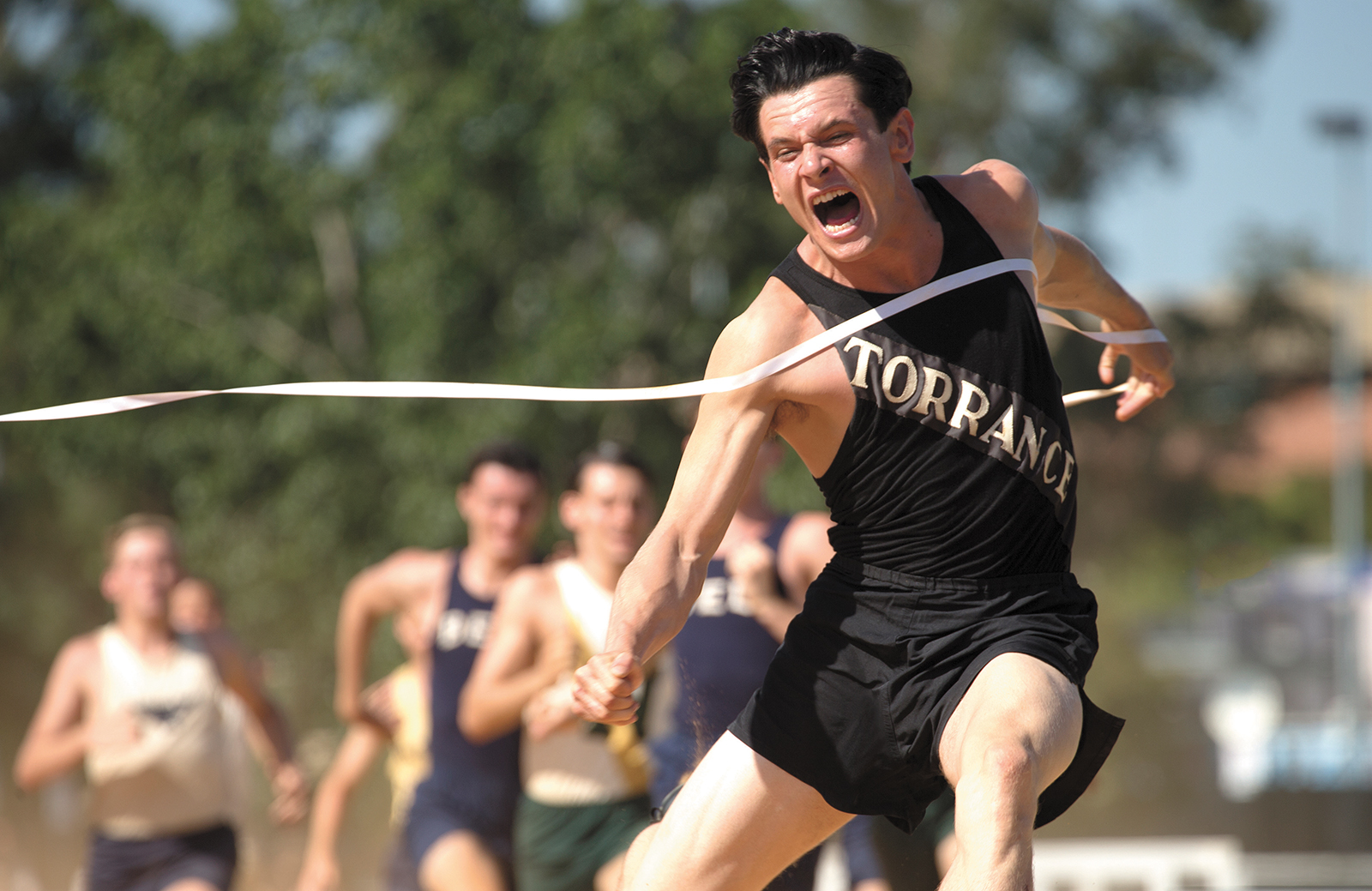The greedy guy on a life raft who eats all the chocolate bars is surely going to die. That’s just one of the moral lessons in Angelina Jolie’s adaptation of the remarkable life story Unbroken, a recent bestseller by Laura Hillenbrand. Since indefatigable hero Louis Zamperini endured so much during World War II—surviving a bomber crash in the Pacific, 47 days on that life raft, then two years of brutal mistreatment in a Japanese POW camp—Jolie needs to extract plenty of lessons, or at least uplift, during her very sincere, stolid movie.
Zamperini’s incredible survival ordeal immediately attracted attention after the war, yet somehow defied being filmed. Maybe that’s because postwar studios wanted simple tales of victory, not suffering and stoicism. (The Best Years of Our Lives was a notable exception.) By the time of revisionist war movies like The Bridge on the River Kwai, Zamperini was forgotten. Then came Hillenbrand’s 2010 book, and Zamperini—who died this summer at age 97—became the object of Jolie’s complete adoration.
Hero worship of this plain, old-fashioned sort has long fallen out of Hollywood favor. Fictions like The Hurt Locker and factual accounts including Clint Eastwood’s forthcoming American Sniper now betray much more ambivalence about war. Jolie’s Unbroken is very much a throwback to the square, patriotic era of Audie Murphy movies, with a protagonist who lacks any quality but virtue and endurance. Starvation, fear, and torture only make him a better man, which is to say a worse screen hero.
After a medias res cold start aboard his bomber (effectively rendered with CGI), we flash back to Louis’ childhood in Depression-era California, where he’s the son of pious Italian-speaking immigrants. Louis is a sneak thief and troublemaker until his older brother introduces him to distance running—which leads to an eighth-place finish in the 5,000 meters at the 1936 Olympic Games in Berlin. (Jesse Owens is glimpsed; Hitler is not.) By this time Louis is played by Anglo-Irish actor Jack O’Connell, who made such an impression as the violent young convict in Starred Up. Louis comes from good people who speak in nothing but inspirational slogans—which, like his prayers, will find many occasions for repeating on the raft and in the POW camps. Though the Coen brothers had a hand in the early draft (not evident here), Jolie’s half-dozen screenwriters deliver their words with the relentless dull thudding of antiaircraft fire.
With its lugubrious
pacing and patina, you can’t wait for Unbroken to get Louis on the raft. (Yes, there will be sharks, in a small mercy for the viewer.) Then you can’t wait for him and his pilot (Domhnall Gleeson, from Frank) to get off the raft and into the prison camp. Then you can’t wait for Louis to get out of the camp and away from its sadistic warden (Japanese pop star Miyavi), who becomes slightly and slyly more interesting while Louis remains the same solemn martyr.
Unbroken is unusual among modern movies with its occasional prayers and God talk. (“Love thy enemy,” a priest instructs Louis as a boy; and that payoff inevitably comes in the postscript, along with photos of the actual Zamperini.) But think back to Fury, a much better WWII movie despite the implausible ending, where Shia LaBeouf’s tank gunner was constantly praying amid the carnage. That was a tough-minded, R-rated war movie, deeply influenced by Saving Private Ryan, but Jolie shies away from such viscera. Death is kept at a distance, like the silently exploding bombs Louis drops from his B-24. When his comrades perish, they do so quietly and without evident suffering.
And, even more problematically, the notions of torture and war crimes are—but for a fleeting postscript that could be easily trimmed for Japanese exhibition—entirely elided. The Geneva Convention existed back then, and the abuse and occasional execution of prisoners during WWII has been well documented. (We see it in both Fury and Saving Private Ryan.) And more, war prisoners talked about it, in a genre that includes Bridge on the River Kwai, Stalag 17, and The Great Escape. Here, all Japanese war guilt is distilled into one figure, Watanabe the warden (dubbed “The Bird,” which has to be the least fearsome nickname ever), who presses into Louis’ face to say things (in English) like “You are like me. We are both strong.” No, really?
Considered as another patriotic tribute to The Greatest Generation (now mostly gone), Unbroken isn’t a terrible movie. Yet as it grinds its way to victory, which is to say survival, there’s the unpleasant sense that we’re prisoners, too, and Jolie our cruel captor.
bmiller@seattleweekly.com
UNBROKEN Opens Thurs., Dec. 25 at Sundance, Pacific Place, and other theaters. Rated PG-13. 137 minutes.








